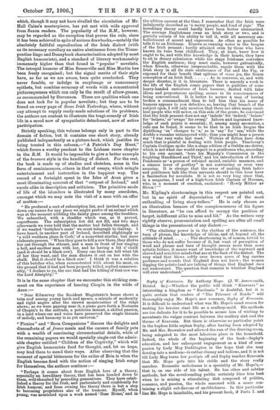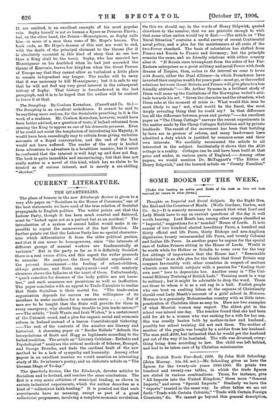Sophy of Sravonia. By Anthony Hope. (J. W. Arrowsmith, Bristol.
6s.)—Whethor the public will think " Kravonia" as interesting a kingdom as " Ruritania " is doubtful, but it is quite certain that readers of " The Prisoner of Zemin, " will thoroughly enjoy Mr. Hope's new romance, Sophy of Kravonia. It is difficult to understand what was Mr. Hope's exact reason for making his heroine start life as a scullery-maid. His methods are too delicate for it to be possible to accuse him of wishing to accentuate the vulgar contrast between the scullery sink and the throne of Kravonia. But there is otherwise no particular point in the hapless little orphan Sophy, after having been adopted by Mr. and Mrs. Brownlow and allowed the run of the drawing-room, being relegated to the most laborious place in the household. Indeed, the whole of the beginning of the book—Sophy's education, and her subsequent engagement as a kind of com- panion by Lady Meg Duddington in the hope that she may develop into a medium—is rather clumsy and tedious, and it is not till Lady Meg turns her protOgie off and Sophy reaches Kravonia that Mr. Hope gets into his stride and the story really marches. Romantic melodrama is a speciality of Mr. Hope's,— that is, on one side of his talent. He has other and subtler methods, but the novel-reading public certainly likes him best when he is mixing a stimulating dish composed of politics, romance, and passion, the whole seasoned with a sauce con- taining a slight sub-flavour of snobbishness. In this particular line Mr. Hope is inimitable, and his present book, if Parts I. and
II. are omitted, is an excellent example of his most popular vein. Sophy herself is not so human a figure as Princess Flavia ; but, on the other hand, the Prince—Monseigneur, as Sophy calls him—is more of a man than some of Mr. Hope's heroes. The book ends, as Mr. Hope's dramas of this sort are wont to end, with the death of the principal claimant to the throne (for it is absolutely essential in this kind of story that no one less than a King shall be the hero). Sophy, who has married her Monseigneur on his deathbed when he had just ascended the throne of Kravonia, leaves her kingdom when the Great Powers of Europe say that they cannot allow so turbulent a little place to remain independent any longer. The reader will be sorry that it was necessary to kill Monseigneur ; but it is safe to say that he will not feel any very great interest in the subsequent history of Sophy. That history is foreshadowed in the last paragraph, and it is to be hoped that the author will be content to leave it at that.















































 Previous page
Previous page